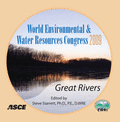Competing Risks and the Development of Adaptive Management Plans for Water Resources: Field Reconnaissance Investigation of Risks to Fishes and Other Aquatic Biota Exposed to Endocrine Disrupting Chemicals (EDCs) in Lake Mead, Nevada, USA
Publication: World Environmental and Water Resources Congress 2009: Great Rivers
Abstract
The analysis and characterization of competing risks for water resources rely on a wide spectrum of tools to evaluate hazards and risks associated with their management. For example, waters of the lower Colorado River stored in reservoirs such as Lake Mead present a wide range of competing risks related to water quantity and water quality. These risks are often interdependent and complicated by competing uses of source waters for sustaining biological resources and for supporting a range of agricultural, municipal, recreational, and industrial uses. USGS is currently conducting a series of interdisciplinary case-studies on water quality of Lake Mead and its source waters. In this case-study we examine selected constituents potentially entering the Lake Mead system, particularly endocrine disrupting chemicals (EDCs). Worldwide, a number of environmental EDCs have been identified that affect reproduction, development, and adaptive behaviors in a wide range of organisms. Many EDCs are minimally affected by current treatment technologies and occur in treated sewage effluents. Several EDCs have been detected in Lake Mead, and several substances have been identified that are of concern because of potential impacts to the aquatic biota, including the sport fishery of Lake Mead and endangered razorback suckers (Xyrauchen texanus) that occur in the Colorado River system. For example, altered biomarkers relevant to reproduction and thyroid function in fishes have been observed and may be predictive of impaired metabolism and development. Few studies, however, have addressed whether such EDC-induced responses observed in the field have an ecologically significant effect on the reproductive success of fishes. To identify potential linkages between EDCs and species of management concern, the risk analysis and characterization in this reconnaissance study focused on effects (and attendant uncertainties) that might be expressed by exposed populations. In addition, risk reduction measures that may be of interest to resource managers are considered relative to emerging contaminants in treated effluents, interdependencies among biological resources at risk, and uses of reservoir waters derived from multiple inflows of widely varying qualities.
Get full access to this article
View all available purchase options and get full access to this chapter.
Information & Authors
Information
Published In
Copyright
© 2009 American Society of Civil Engineers.
History
Published online: Apr 26, 2012
ASCE Technical Topics:
- Adaptive systems
- Bodies of water (by type)
- Disaster risk management
- Ecosystems
- Engineering fundamentals
- Environmental engineering
- Field tests
- Fish and fishery management
- Freight transportation
- Infrastructure
- Lakes
- Logistics
- Resource management
- Risk management
- Systems engineering
- Systems management
- Tests (by type)
- Transportation engineering
- Water and water resources
- Water management
- Water policy
- Water quality
- Water resources
- Water treatment
Authors
Metrics & Citations
Metrics
Citations
Download citation
If you have the appropriate software installed, you can download article citation data to the citation manager of your choice. Simply select your manager software from the list below and click Download.
